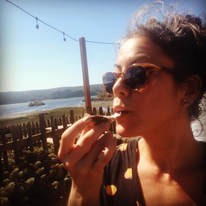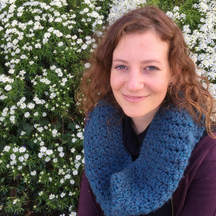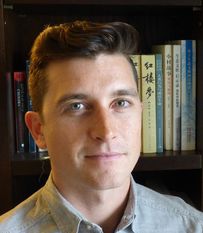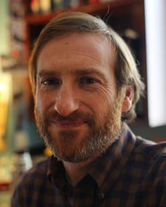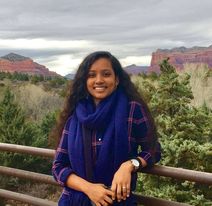SCHOLARS OF THE LEFT COAST POLITICAL ECOLOGY NETWORK
|
Sophie Sapp Moore earned her PhD in Cultural Studies with a Designated Emphasis in Critical Theory in 2018. Sophie is currently a Mellon postdoctoral fellow on the Plantationocene at the University of Wisconsin-Madison. She is transforming her dissertation project, Futures Otherwise: Radical Life on Haiti's High Central Plateau, into a book manuscript. Futures Otherwise is an ethnographic and historical study of agrarian change in Haiti’s hinterland. Sophie’s research is both indebted to a long critical humanist tradition in Caribbean studies, and committed to a nascent project of decolonial political ecology in the post-plantation Americas. Her research draws from anthropology and geography to examine the emergence of radical socio-ecologies through the transformations of agrarian landscapes in the Americas. Sophie is conducting ongoing ethnographic research around livestock socio-ecologies on Haiti's High Central Plateau.
Ashton B. Wesner, (B.A., Pomona College) is a PhD candidate at UC Berkeley in the Society and Environment Division of the Environmental Science, Policy and Management (ESPM) Department. She is training as a political ecologist with concentrations in feminist science and technology studies and cultural and ethnic studies. Her dissertation research analyzes the relationship between environmental politics and representations of science and technology in the context of ongoing settler colonialism in the Columbia River Gorge National Scenic Area, and trace how the “Scenic Value” of the gorge landscape is produced through histories of displacement vis a vis hydropower industry. Ashton works as a Graduate Student Instructor and Mentor, with training in teaching writing, to undergraduates across disciplines at UC Berkeley and Pomona College.
|
Jeff is a PhD candidate in the Department of Geography at UC Berkeley. He is currently completing his dissertation on gray wolf conflict and coexistence efforts in Central Idaho. Previous research has focused on Kew Gardens Millennium Seed Bank Project (MSc University of Manchester, 2011), and Arizona's Gila River Indian Community Water Settlement Act (BA UC Berkeley, 2008), and he has also worked in environmental compliance for the Department of Defense. Jeff is also interested in the politics and practices of "worldbuilding" in games and speculative fiction, and in his free time pursues interests in artwork and political activism.
Ingrid Behrsin is a PhD candidate in the Geography Graduate Group at UC Davis. Her research focuses on the ways that political economic processes, scientific knowledge production, and citizen mobilization converge around environmental infrastructure projects. Her dissertation attends to the material and discursive construction of waste as a renewable energy source in the European Union, and investigates the ecological, economic, and political implications of this framing in the context of waste-to-energy (WTE) production. She operationalizes this work through comparative, multi-sited case studies of WTE projects in two Austrian states.
PhD Student at UC Davis.
Alejo is a PhD student in the Geography Graduate Group at UC Davis. He researches the practices and politics of socioecological restoration in the Sacramento-San Joaquin Delta. His research is informed by political ecology, infrastructural ethnography, and reparation/restoration ecology.
|
Laura is a PhD Candidate in the Society & Environment Division of the Environmental Science, Policy and Management Department at UC Berkeley. Her studies are focused at the intersection of political ecology, feminist science & technology studies, and ethnobotany. Specifically, her dissertation research uses an interspecies lens to explore pathways by which certain medicinal plants, rituals, and knowledge travel between the Peruvian Amazon and California. Laura is currently the research coordinator at Alianza Arkana, a Peruvian non-profit organization, where she facilitates community-based participatory projects in Indigenous communities. She holds an MS in ecology from Colorado State University for work studying climate change and grazing on grassland plant communities, and a B.S. from Tufts University in biology and mathematics.
Kelly Kay is an Assistant Professor in the Department of Geography at UCLA. She received her PhD in Geography from Clark University in 2016. Through engagements with law and political economy, her work addresses four major topics: the ongoing privatization of conservation lands in the United States and Europe; the politics of environmental valuation; the historical evolution of environmental law and governance under neoliberalism; and the current and historical restructuring and financialization of the United States’ industrial forest estate.
|
Juliet is a doctoral student at UC Berkeley’s Department of Environmental Science, Policy and Management with a focus on political ecology. She worked from 2009-2011 at the World Agroforestry Centre in Yunnan, China and from 2012-2013 with the Centre for Development and Environment in Vientiane, Laos. Her research examines the political economy of Chinese agribusiness companies’ investments in Laos – primarily in rubber plantations. Her broader research interests involve the impacts of China’s growing demand for raw materials on land and natural resource management in Southeast Asia, and China's South-South development cooperation initiatives.
Julia Sizek is a PhD student in Anthropology at UC-Berkeley. Her research is focused on contemporary land conservation projects in Southeastern California's Eastern Mojave Desert, where she collaborates with the Native American Land Conservancy (an intertribal land trust). She is interested in the political economy of the desert, environmentalism, and the ways in which these intersect with projects of historical/cultural preservation and biological conservation.
Mike Simpson is a PhD candidate in the Department of Geography at the University of British Columbia. His work engages with topics related to political ecology, settler colonialism, urban geography, and post-humanism. His dissertation research considers recent conflicts over oil pipelines in North America as a window into the contemporary political moment. Specifically, he studies how these pipeline developments can be understood as part of a larger project of neoliberal re-spatialization, and how environmental organizations and Indigenous peoples of North America challenge and contest these developments by affirming alternate spatial orders that bring forth new political and economic relations. Mike is affiliated with the Liu Institute for Global Issues at UBC, and the Center for Global Studies at the University of Victoria. Beginning in September 2017, he will be a visiting Fulbright scholar at the University of Minnesota.
|
|
Key is a PhD candidate in History of Consciousness at UC Santa Cruz. His dissertation looks at various forms of “waste” in US cities from San Francisco to Baltimore, mapping the ways in which the disposal of people/things gives shape to value production and collective memory – within the city itself but also on a more global scale. Key is also working on a book-length project with Katharyne Mitchell on spaces of refugee sanctuary in Europe and histories of insurgency. Other areas of research include climate policies in California, noise complaints in Seattle, early Frankfurt School critical theory, and the tradition of time-geography.
Gustavo de L. T. Oliveira is assistant professor of international studies at the University of California, Irvine, and visiting assistant professor of geography at Peking University, China. He obtained his PhD in geography from UC Berkeley, and was postdoctoral fellow in environmental studies at Swarthmore College. His scholarship encompasses three interconnected lines of research: (1) The political ecology of transnational agribusiness and infrastructure, focusing on Chinese investments in Brazilian agribusiness and infrastructure for South American integration. (2) Environmental governance of farmland and biofuels, particularly as transformed by new financial instruments for transnational investments by Chinese companies and US pension funds in Brazil. (3) The co-production of racial and environmental discourses about East Asian diasporas in Latin America, and its implications for contemporary migration and economic cooperation. He is member of the international secretariat of the BRICS Initiative for Critical Agrarian Studies, and co-editor with Susanna Hecht of "Soy, Globalization, and Environmental Politics in South America" (Routledge, 2018).
|
Jesse is a Ph.D. candidate in Geography at the University of California, Berkeley. He researches the cultural production of ecological modernity, peri-urban environmental governance, rural-urban political economic and socio-spatial transitions in China. His work explores how ecological sciences shape the cultural politics of nature and development, as well as the transitional reconfigurations of rural-urban spaces and livelihoods through peri-urban sites of ecological protection zoning across Southwest China’s Yunnan and Sichuan Provinces.
Cristina is a Masters Student in the Department of Human Ecology at UC Davis. Her research centers on natural resource management and acess to protected areas, in the US and within Central America. Her research stems from, and has evolved alongside engaged community strategies that promote biological literacy, local forms of knowledge and incorporate leadership and job training.
|
|
Adam is a PhD student in the Department of Geography at the University of California at Berkeley. He spends a lot of time thinking about so-called peasant fishers, marine/coastal/spaces, natural resource communities, the creation/recreation of place, neoliberalism, uneven development and the ocean. Geographically, he focuses on India. Adam also holds a master’s degree from American University in global environmental policy and a bachelor’s degree from the University of Illinois in journalism.
Casey Walsh is Professor of Anthropology at UCSB. His first book (Building the Borderlands, Texas A&M, 2008) tells the regional story of how capital, water, land and labor were brought together to grow cotton in the Mexico-US borderlands, forming environments, communities and cultures in the process. His second book (Virtuous Waters, UC Press, 2018) explores the long history of everyday engagements - drinking, bathing - with water in Mexico. He is currently working on a project about the use and management of groundwater in California.
|
Pradnya Garud is a Ph.D. student in the School of Geography and Development. She received her Master of Science in Environmental Sciences from the Institute of Science, Mumbai, and completed a Post-Graduate Diploma in Disaster Preparedness and Response at the Tata Institute of Social Sciences. Prior to starting her Ph.D., Pradnya worked in a research and advocacy capacity with a Delhi-based human rights organization, through which she conducted fieldwork in several post-disaster contexts across India. Her scholar-activist work transects terrains of radical environmental and human geography. These include social movements, political geography and state theory, political ecology, indigenious methodologies, critical development, and labor studies. Her most recent research work focuses on analyzing climate induced migration and its impacts on informal labor practices in urban regions of India through marginalized and indigenous perspectives.
|
